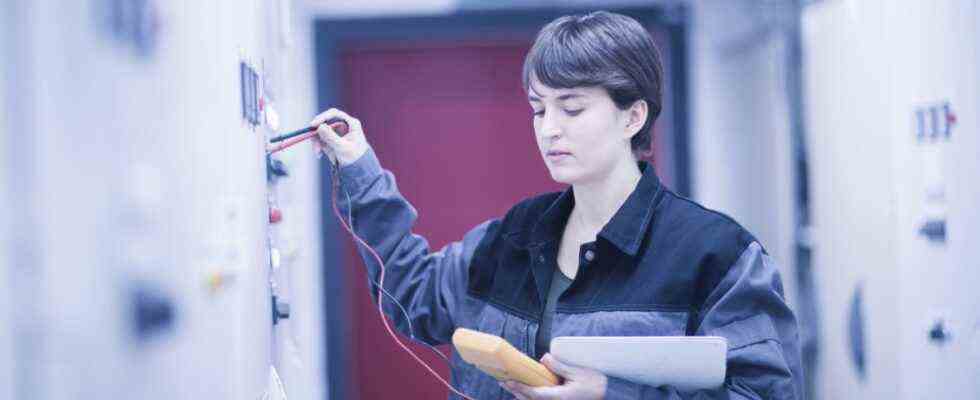The strongest corona wave to date is hardly noticeable on the German labor market. Shops and restaurants are suffering from the restrictions, but overall employment is not falling. Unemployment increases as always in winter, for example because construction sites are idle. In January, 2.46 million citizens were unemployed, 130,000 more than in December. If the winter effect is factored out, the number of unemployed actually fell by 50,000.
“The job market got off to a good start in 2022,” says Daniel Terzenbach, head of the Federal Employment Agency. Unemployment has not risen nearly as much as it usually does in winter. The numbers show how Germany is finding its way out of the Corona crisis. Almost half a million more people had jobs in January than a year ago. The restrictions on shops and restaurants caused by the pandemic are particularly evident in more short-time work. So companies don’t lay off their employees, they keep them.
For the coming months, the trend on the labor market is upwards. The barometer of the Institute for Labor Market and Occupational Research (IAB) rose slightly in January – for the first time since August. “Omicron is growing into the highest corona wave to date, but the job market could get through without major scratches,” analyzes IAB forecast manager Enzo Weber. This is due to the hope that despite the record number of infections, there will be no need to further restrict the operation of shops and restaurants.
The situation is likely to improve from spring anyway, when Germans go shopping and eating out more – due to the nicer weather and the expected slackening of Omicron. In the first year of Corona with the many closures, citizens saved about a third more money than usual. They will probably spend a good part of that again. Economic researchers expect that private consumption will be the main driver – and that the German economy will grow significantly in 2022, by three to four percent. According to the IAB forecast, the number of unemployed will fall by 300,000 this year. In December, a good 45 million people were in work, that was still the case 200,000 less than before the outbreak of the pandemic.
The big test for growth and the labor market is now: are companies’ supply problems slowly resolving? Then the companies can work off their mountain of orders, make more sales and hire people.
“In the fall, the economy was burdened by delivery bottlenecks. But they could slowly ease up,” says IAB researcher Weber. In January, only 67 percent of the companies reported that they had problems getting intermediate products and raw materials. In December it was 82 percent. However, the Ifo Institute has not yet given the all-clear. “It is not yet clear whether this is a trend reversal,” says researcher Klaus Wohlrabe. Above all, classic industrial sectors such as automobiles and mechanical engineering continue to wait for parts more often than average.
The economy remains skeptical. Nine out of ten Bavarian metal and electrical companies are currently unable to process their orders due to a lack of material, reports Bertram Brossardt, Managing Director of the VBW trade association. “This is developing into an upswing killer.” Production will only increase slightly this year – and thus not compensate for much more than the decline in 2021. Some economic researchers, on the other hand, believe that the supply bottlenecks will resolve more quickly.
What compulsory vaccination means for work
There is a heated discussion about what the planned general obligation to vaccinate would mean for the labor market. Companies would then have the right to check whether someone has been vaccinated or not, says job agency boss Detlef Scheele. So far they are not allowed to ask. Employees only have to prove that they have been vaccinated, recovered or recently tested (3-G rule). If vaccination is compulsory, companies should probably reject unvaccinated applicants, according to Scheele. His authority would then have to check whether unvaccinated unemployed people would not receive unemployment benefits for a certain period of time. According to the law, someone only gets unemployment benefits if they are really available for the job market.
Scheele has been criticized by FDP Federal Deputy Wolfgang Kubicki, who rejects mandatory vaccination anyway: “The fact that people are put in the laces simply because of their vaccination status has become unbearable for me”. Left-wing politician Sahra Wagenknecht spoke of “arbitrariness and social blackmail”.
Discussions are underway in the federal government on how compulsory vaccination will be anchored in labor law. For example, it could be more effective than a fine for enforcing vaccination if health authorities forbid unvaccinated employees to enter their company.
return of staff shortages
Meanwhile, many companies are concerned that a problem that was annoying them before the outbreak of the pandemic is reappearing: a lack of suitable employees. According to the German Economic Institute, there is currently a shortage of around 400,000 skilled workers. That’s even 50,000 more than before the start of Corona. Engineers and computer scientists are particularly sought after, but also craftsmen and truck drivers.
The population is aging and shrinking, leaving fewer workers available each year. In Bavaria alone, the supply of workers will be reduced from 6.5 million today to 5.8 million by 2035, Brossardt expects. Contrary to what many believed, the country was not particularly short of academics. Brossardt fears major bottlenecks among skilled workers with training, for example in the vehicle industry, in building services engineering and health.

